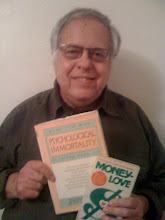Of course, the big difference is that when you remove a bandaid, healing has often occurred. This is not true with a human bandaid. When someone you have been using in this way disappears from your daily life, by moving or dying or even going away to college and leaving that empty nest behind, instead of healing, the festering wound is reopened--worse than ever. Some people use a sequential set of relationships to keep covering up those symptoms, and this is done in many different forms. Some years ago, I did this by getting involved with a very beautiful, very sexy, and very happy, nurturing woman. The only problem was she was extremely high maintenance. She required constant attention day and night. I thought it was a pretty good trade-off at the time, as she provided a lot of pleasure. But it gave me a great excuse for not dealing with some major issues I should have been dealing with, and probably indirectly led to my ending up broke and in prison.
Sometimes even work acts as this kind of temporary bandaid--men particularly sometimes use intense focus and commitment to work as a way of avoiding commitment and responsibility in other areas of their lives.
One of the oddest manifestations of this bandaid effect is when someone uses personal growth programs and workshops to avoid dealing with the pain deep within them. I remember some years ago there being a very popular series of weekend workshops that required total absorption of participants with a very rigid structure. So much so, that someone attending would have no time or emotional energy left to deal with any depression or issues buried deep within their core.
It almost sounds like a joke, but my friend attends a grief group to deal with the absence of her daughter, now happily attending college in another state. All the other members of the grief group are dealing with the death of a loved one. But my friend says her pain is just as real, and the counselor has told her it may even be a deeper sense of grief because the person she is mourning is still alive. I suppose it is harder to let go of someone who still exists but is no longer in close proximity.
Sometimes it hurts to quickly tear off a bandaid, but that is a small price to pay for the healing impact if we take the opportunity to seek a more permanent solution.
Jerry
Check out my prosperity blog: http://MoneyloveBlog.com
